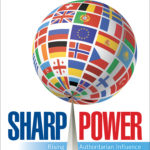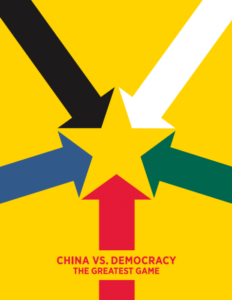Cold War analogies aside, the world is in a battle for ideas, values, and the protection of sovereign democracies from outside influence and interference, argues Kevin Sheives – associate director of the International Forum for Democratic Studies at the National Endowment for Democracy, and a China specialist formerly at the U.S. Departments of State, USTR, Defense and Congress.
The concept of sharp power points to how outside authoritarian governments impair free expression, neutralize independent institutions, and distort the political environment, he tells Mercy A. Kuo. These malign actors span Russia, Iran, Venezuela, and others like the Gulf states. However, only China can pair economic and diplomatic power with global ambition and corrosive intent. China’s actions, led by the Chinese Communist Party (CCP), are more subtle than Russia’s interference attempts, Sheives observes in the Diplomat.

National Endowment for Democracy (NED)
The early Cold War offers a useful parallel, say two leading analysts. At that time, American leaders understood that winning the long-term struggle against the Soviet Union required not losing crucial battles in the short term. The Marshall Plan, unveiled in 1947, was meant to prevent economic collapse in Western Europe, because such a breakdown might allow Moscow to extend its political hegemony over the entire continent. Strategic urgency was the prelude to strategic patience: the United States could exploit its lasting economic and political advantages only if it closed off more immediate vulnerabilities, according to Michael Beckley and Hal Brands.
The diffusion of Chinese-made surveillance technology could entrench autocrats and cause lasting harm to global prospects for democracy, they write for Foreign Affairs:
Over the past two years, a number of advanced democracies have spurned Huawei, China’s main national champion. But Beijing’s Digital Silk Road remains popular where democracy is less established and China’s low-cost products are especially attractive. To check China’s technological expansion, Washington should restrict the export of technologies made in the United States and other democracies on which Chinese technology still depends. These include semiconductors, AI chips, and computer numerical control (CNC) machines. By withholding such products, the United States and its democratic allies can retard Beijing’s technological progress and buy time to offer developing countries alternatives to Chinese networks.
 Democracies must educate their citizens and institutions through extraordinary transparency measures about these challenges from China, Russia, or other authoritarian actors, the NED’s Sheives adds, citing the impactful work being done by the thousands of international and local NGOs to build good governance is table stakes:
Democracies must educate their citizens and institutions through extraordinary transparency measures about these challenges from China, Russia, or other authoritarian actors, the NED’s Sheives adds, citing the impactful work being done by the thousands of international and local NGOs to build good governance is table stakes:
Greater investments must be made in investigative journalism and a much stronger partnership between platforms, regulators, activists, and researchers to combat disinformation. Current laws against foreign money and agents in U.S. politics are a good baseline, but democracies should expand on them to include measures like foreign investment screening and transparency of foreign funding in think tanks and universities. In an era of less independent media, rampant disinformation, and a sanitized view of China provided by its state media giants, China’s model of governance can be opaque. But when democracies peak behind the curtain, they usually don’t like what they see… and institutions often organically adjust in profound, innovative ways.
China’s Challenges to Global Democracy addressed by Kevin Sheives of the @NEDemocracy‘s @ThinkDemocracy @Diplomat_APAC https://t.co/20YU9qWQbo
— Democracy Digest (@demdigest) December 22, 2020
During the annual Seymour Martin Lipset Lecture on Democracy in the World on December 3. 2020, Dr. Minxin Pei explored how the influence of totalitarian institutions, such as the Leninist party-state, control of economic “commanding heights,” and a pervasive surveillance state, left intact after four decades of economic reform, raise doubts about whether economic modernization can create favorable conditions for democracy in China. Watch the teaser, full lecture in English and Mandarin, and discussion (above).
The Chinese Communist Party is working to export authoritarianism. Democracies must protect themselves and help partners build resilience to malign #CCP influence. https://t.co/wsGVUlRCta
— Daniel Twining (@DCTwining) December 17, 2020







